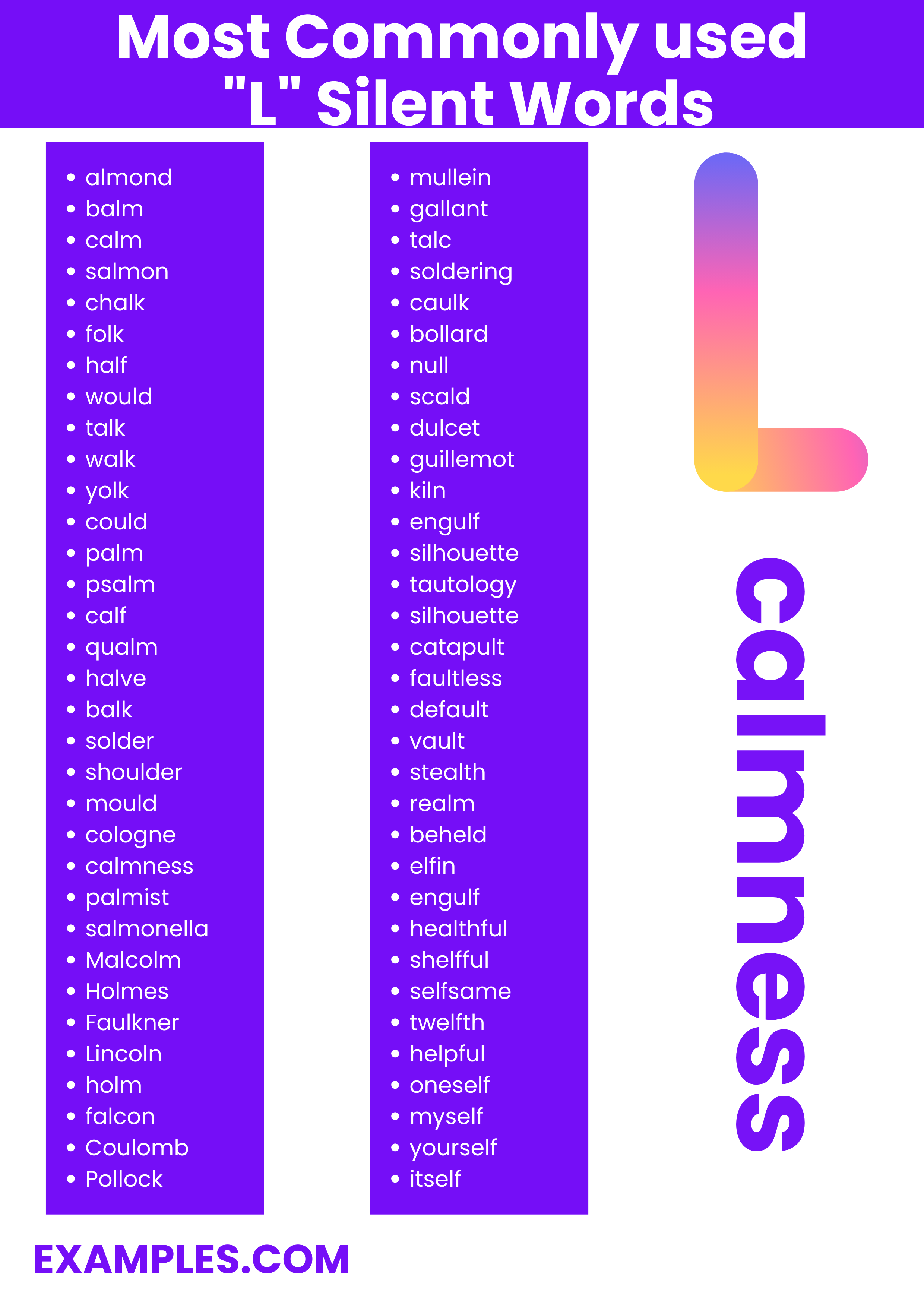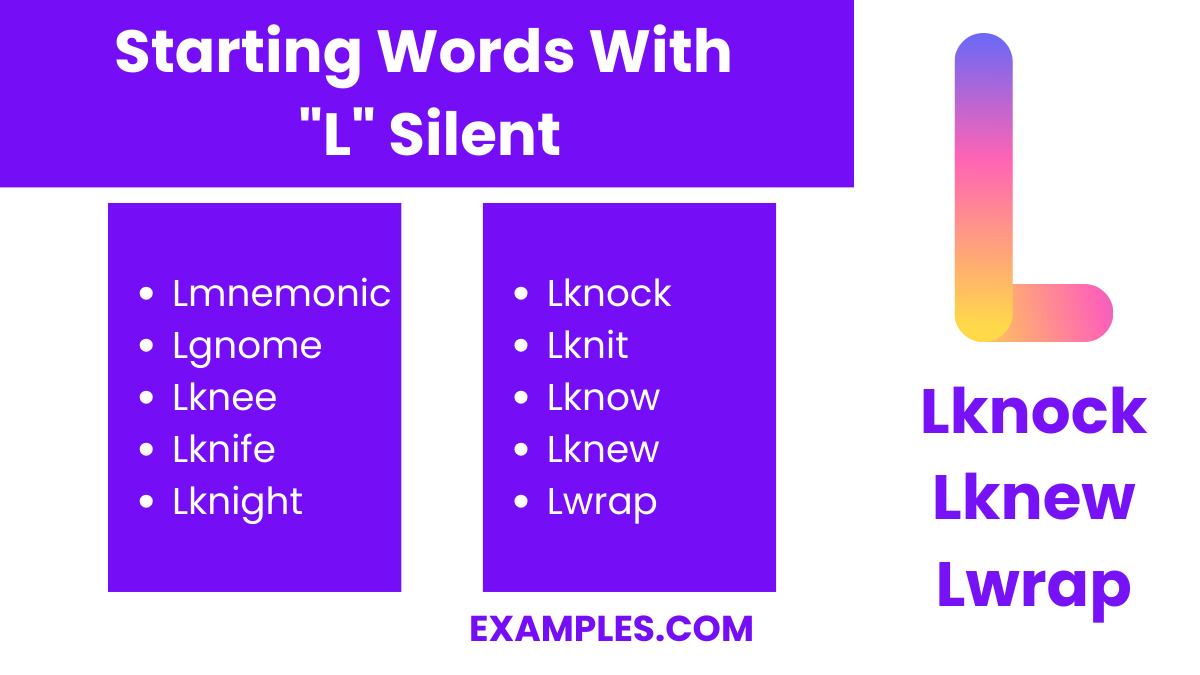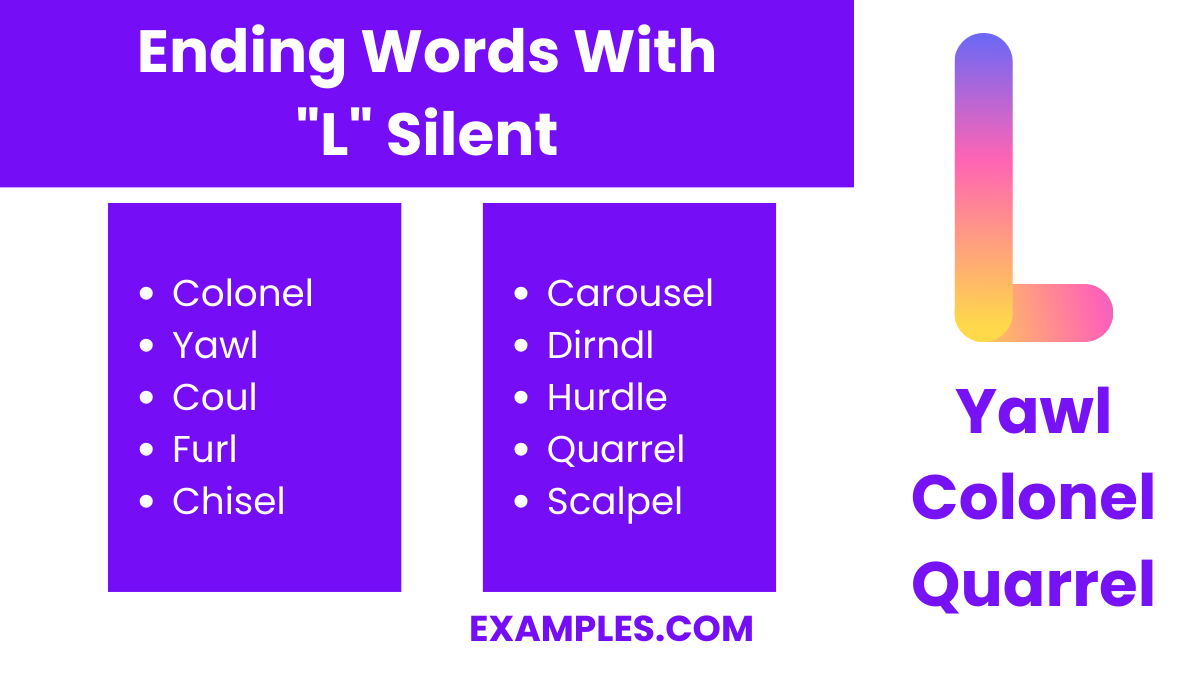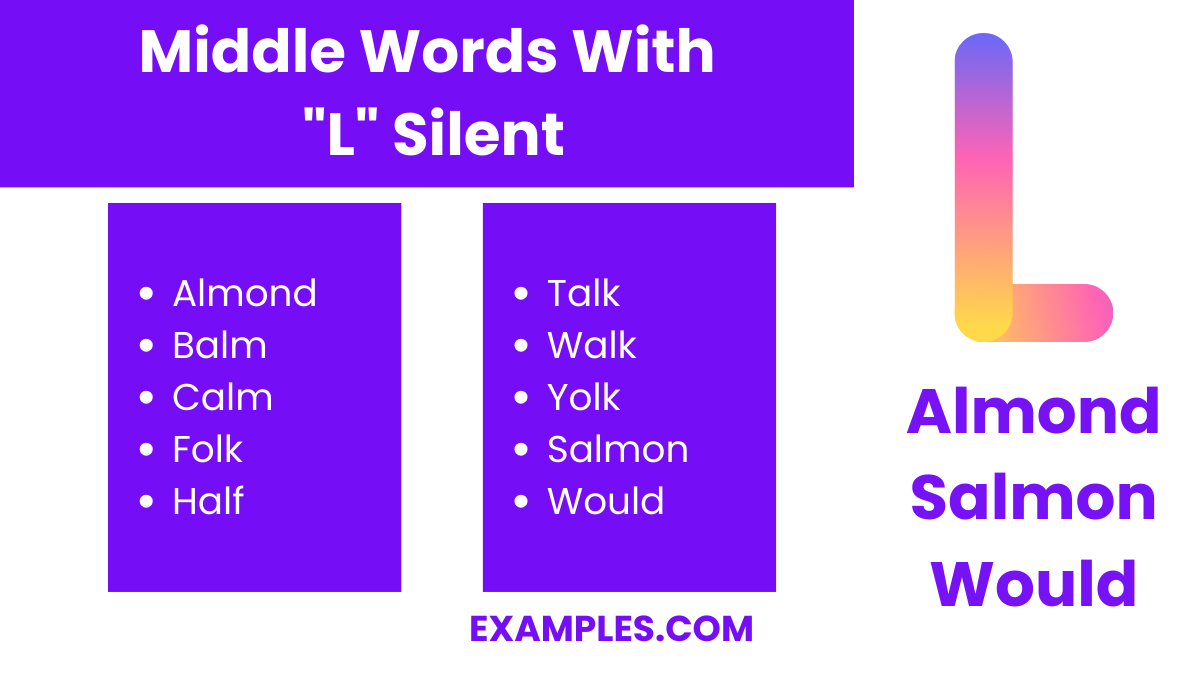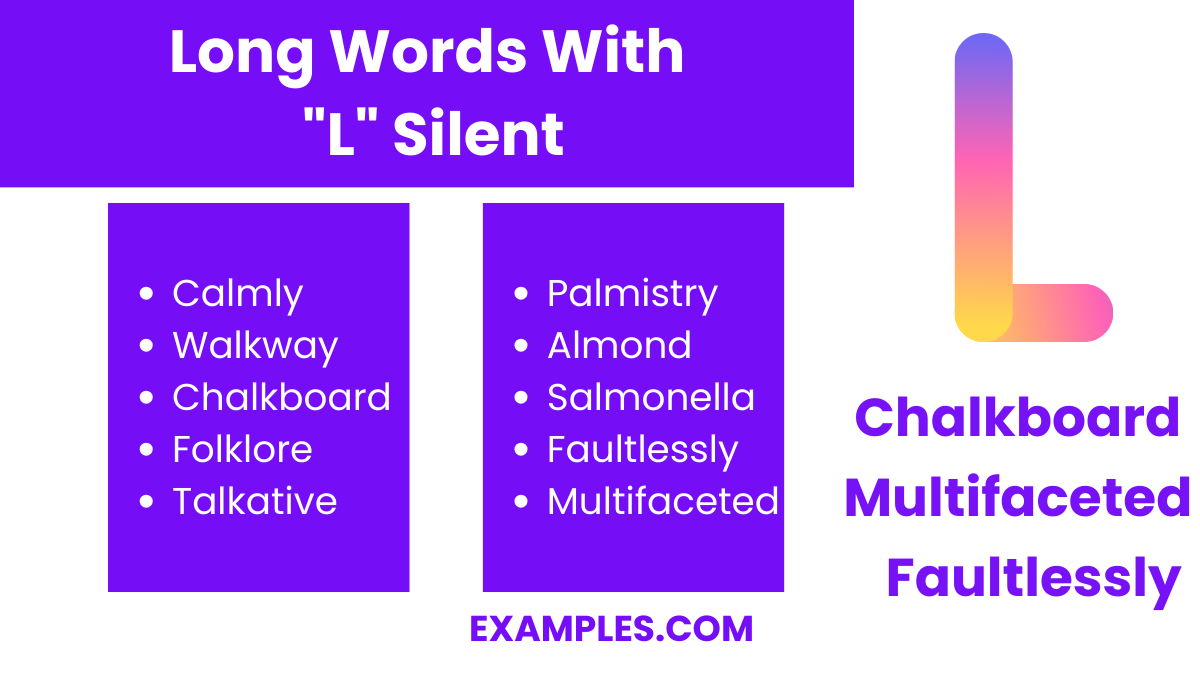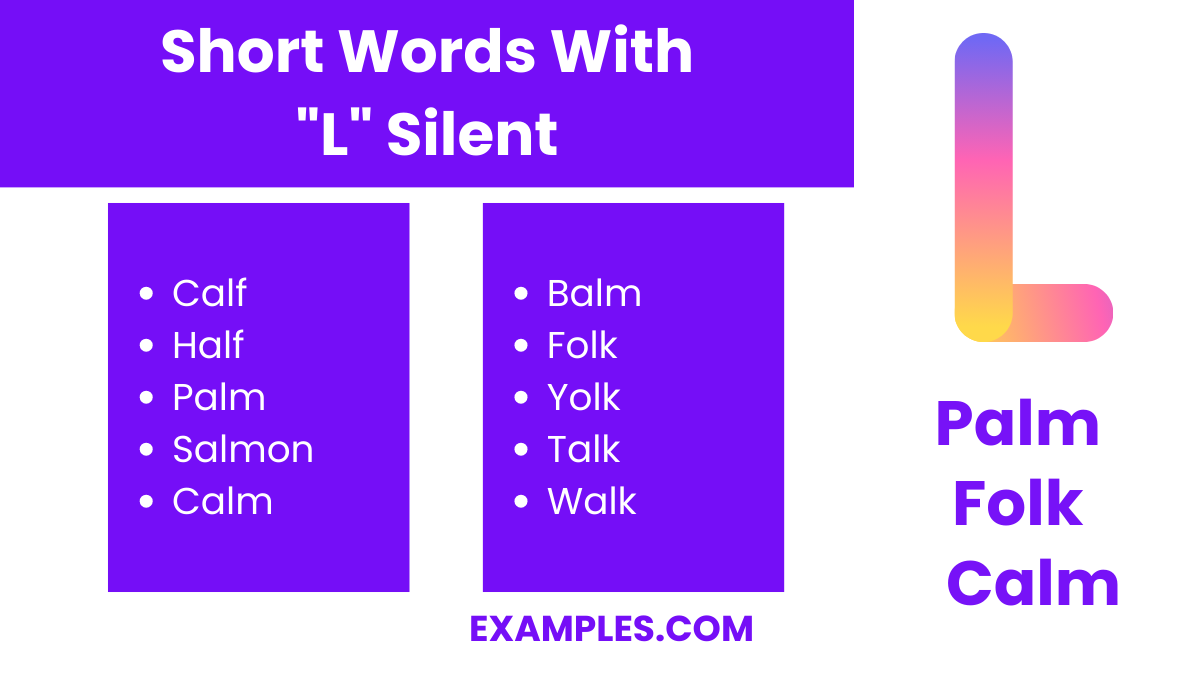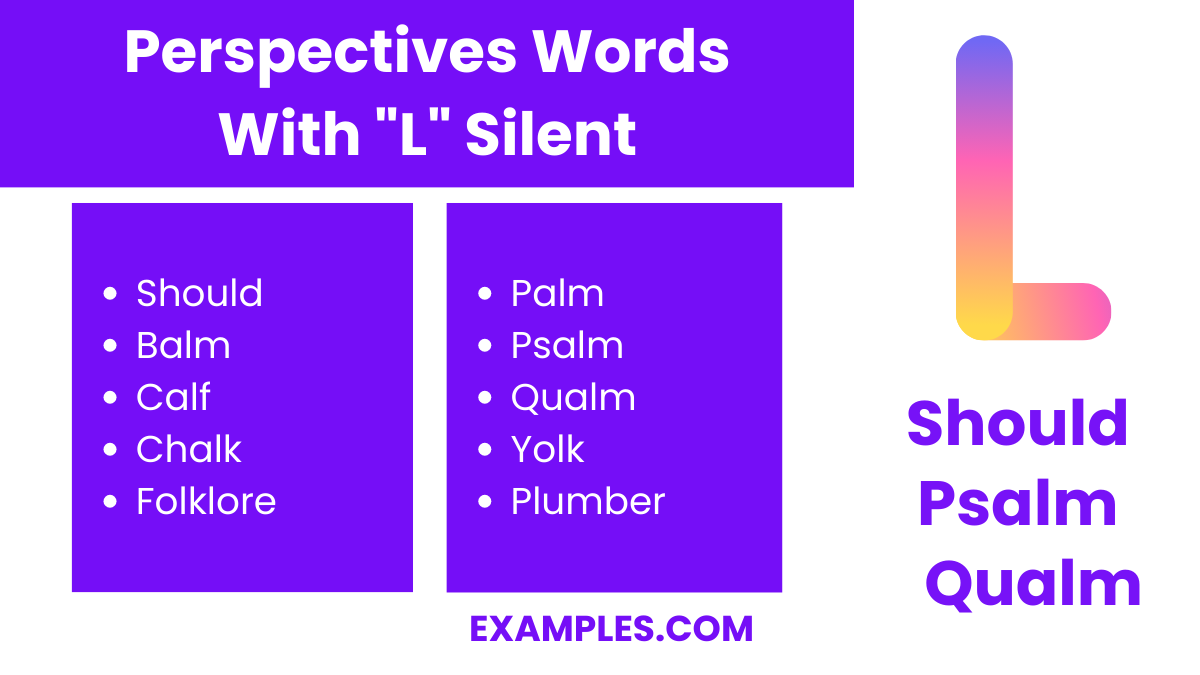450+ L Silent Words List, Meaning, PDF
The silent “L” in English is a linguistic curiosity, often found lurking in words where it goes entirely unpronounced, adding a layer of sophistication to the language. This subtle phonetic feature can be a stumbling block for learners but mastering it is a hallmark of linguistic prowess. Our exploration into silent “L” words unveils this hidden gem of English pronunciation, offering a fascinating insight into the language’s complexity and elegance. Perfect for expanding vocabularies and fine-tuning pronunciation skills, this collection is a must-discover for language enthusiasts.
Download Most Commonly Used L Silent Words - PDF
50+ Most Commonly used “L” Silent Words
In the Daily Use English Words, contain letters that are not pronounced, creating a unique challenge for learners and speakers alike. One such letter is the “L,” often silent in various contexts. This phenomenon can be observed in a multitude of words, where the “L” is present in spelling but remains unvoiced when spoken. Understanding these words is crucial for proper pronunciation and effective communication. Below is a table of 100 commonly used words with a silent “L,” accompanied by their phonetic transcriptions to aid in correct pronunciation.
| Word | Phonetic Transcription | Word | Phonetic Transcription | Word | Phonetic Transcription |
|---|---|---|---|---|---|
| almond | ‘ɑːmənd | balm | bɑːm | calm | kɑːm |
| salmon | ‘sæmən | chalk | tʃɔːk | folk | foʊk |
| half | hɑːf | would | wʊd | talk | tɔːk |
| walk | wɔːk | yolk | joʊk | could | kʊd |
| palm | pɑːm | psalm | sɑːm | calf | kæf |
| qualm | kwɑːm | halve | hɑːv | balk | bɔːk |
| solder | ‘sɒdər | shoulder | ‘ʃoʊldər | mould | moʊld |
| cologne | kə’loʊn | calmness | ‘kɑːmnəs | palmist | ‘pɑːmɪst |
| salmonella | ˌsæmə’nɛlə | Malcolm | ‘mælkəm | Holmes | hoʊmz |
| Faulkner | ‘fɔːknər | Lincoln | ‘lɪŋkən | Holmes | hoʊmz |
| holm | hoʊm | falcon | ‘fɔːlkən | Coulomb | ‘kuːlɒm |
| Pollock | ‘pɒlək | mullein | ‘mʌlɪn | gallant | ‘gælənt |
| talc | tælk | soldering | ‘sɒdərɪŋ | caulk | kɔːk |
| bollard | ‘bɒlərd | null | nʌl | scald | skɔːld |
| dulcet | ‘dʌlsɪt | guillemot | ‘gɪlɪmɒt | kiln | kɪln |
| engulf | ɪn’gʌlf | silhouette | ˌsɪlu’ɛt | tautology | tɔː’tɒlədʒi |
| silhouette | sɪlʊˈɛt | catapult | ‘kætəpʌlt | faultless | ‘fɔːltləs |
| default | dɪ’fɔːlt | vault | vɔːlt | stealth | stɛlθ |
| realm | rɛlm | beheld | bɪ’hɛld | elfin | ‘ɛlfɪn |
| engulf | ɪn’gʌlf | healthful | ‘hɛlθfʊl | shelfful | ‘ʃɛlffʊl |
| selfsame | ‘sɛlfsɛm | twelfth | twɛlfθ | helpful | ‘hɛlpfʊl |
| oneself | wʌn’sɛlf | myself | maɪ’sɛlf | yourself | jɔːr’sɛlf |
| itself | ɪt’sɛlf | ourselves | ɑːr’sɛlvz | themselves | ðɛm’sɛlvz |
| calfskin | ‘kæfskɪn | wolfish | ‘wʊlfɪʃ | gulf | gʌlf |
Starting Words With “L” Silent
Diving into the English language reveals fascinating features, such as the silent “L” at the beginning of certain words. This characteristic can be challenging for students learning English. As educators, it’s our responsibility to guide students through these peculiarities, enhancing their pronunciation and understanding. The following list includes words where the “L” at the start remains unvoiced, a crucial aspect for students aiming to polish their English communication skills.
- Lmnemonic (niˈmänik): Relating to or designed to assist the memory.
- Lgnome (nōm): A mythical diminutive spirit supposed to inhabit the earth’s interior and guard buried treasure.
- Lknee (nē): The joint between the thigh and the lower leg in humans.
- Lknife (nīf): A tool or weapon with a metal blade and a handle, used for cutting.
- Lknight (nīt): A man awarded a nonhereditary title by a sovereign in recognition of merit or service and entitled to use “Sir” in front of his name.
- Lknock (näk): To strike a surface noisily to attract attention, especially when waiting to be let in through a door.
- Lknit (nit): To make clothes, blankets, etc., by interlocking loops of wool or other yarn with knitting needles or on a machine.
- Lknow (nō): To be aware of through observation, inquiry, or information.
- Lknew (nü): Past tense of “know.”
- Lwrap (rap): To cover or enclose something in paper or soft material.
Ending Words With “L” Silent
In the realm of English pronunciation, there exists a subtle yet intriguing feature where the “L” at the end of certain describing words remains silent. This characteristic can often perplex learners, making it a crucial aspect for educators to highlight. By focusing on these words in their lessons, teachers can greatly assist students in mastering the complexities of English pronunciation, thereby enhancing their linguistic capabilities. Below is a specially curated list for educational purposes, featuring words that conclude with a silent “L,” each accompanied by a concise definition. This approach not only aids in pronunciation but also in understanding and retention, making the learning process more effective and engaging.
- Colonel (/ˈkɜrnəl/): A military rank in many armed forces, particularly the army.
- Yawl (/jɔːl/): A ship’s small boat, rowed by a crew of four or six.
- Coul (/kuːl/): A variant spelling of “cool,” used historically in poetry or stylized text.
- Furl (/fɜːrl/): To roll or fold up securely, typically referring to sails or flags.
- Chisel (/ˈtʃɪzəl/): A hand tool with a flat steel blade for shaping wood, stone, or metal.
- Carousel (/ˌkærəˈsɛl/): A merry-go-round, a rotating machine with seats for riders.
- Dirndl (/ˈdɜːrndəl/): A traditional feminine dress worn in Austria, South Tyrol, and Bavaria.
- Hurdle (/ˈhɜːrdəl/): An obstacle or barrier over which one must leap in racing competitions.
- Quarrel (/ˈkwɒrəl/): An angry argument or disagreement.
- Scalpel (/ˈskælpəl/): A small and extremely sharp bladed instrument used for surgery.
Middle Words With “L” Silent
The silent “L” nestled in the middle of certain English words offers an intriguing challenge for learners. Educators are key in unraveling these pronunciation mysteries, helping students to skillfully maneuver through the complexities of English. Presented here is a collection of dictation words that feature a silent “L” in their midst, a crucial resource for students dedicated to improving their spoken English proficiency. Through focused dictation exercises incorporating these words, learners can refine their understanding and mastery of English pronunciation, enhancing their overall language skills.
- Almond (ˈämdənd): A type of nut with a sweet taste.
- Balm (bäm): A fragrant ointment or preparation used to heal or soothe the skin.
- Calm (käm): Peaceful, tranquil, without rapid motion.
- Folk (fōk): People, especially those of a particular group or type.
- Half (haf): One of two equal parts of something.
- Talk (tôk): To speak in order to give information or express ideas or feelings.
- Walk (wôk): To move at a regular pace by lifting and setting down each foot in turn.
- Yolk (yōk): The nutrient-rich yellow part of an egg.
- Salmon (ˈsamən): A type of fish that is commonly eaten as food.
- Would (wəd): Used to indicate the past tense of “will” or a condition in the past.
Long Words With “L” Silent
Exploring the silent “L” within long compound words unveils a captivating aspect of English phonetics, intriguing both educators and learners. This phonetic quirk adds a layer of complexity to the language, presenting a unique pronunciation challenge that often diverges from the spelling. For students keen on refining their linguistic abilities, particularly in pronunciation and spelling, grasping these words is essential. Teachers can greatly enrich students’ vocabulary by weaving long compound words with a silent “L” into their lessons, supporting their journey towards English mastery. This exploration not only enhances communication skills but also deepens students’ appreciation for the subtleties of English phonetics. Here’s a thoughtfully curated list of ten long compound words where the “L” remains silent, each complemented by a succinct definition and phonetic pronunciation, designed to aid educators in delivering engaging and insightful lessons.
- calmly (ˈkɑːm.li) – In a peaceful and quiet manner.
- walkway (ˈwɔːk.weɪ) – A path or passage designed for people to walk along.
- chalkboard (ˈtʃɔːk.bɔːrd) – A blackboard used for writing on with chalk.
- folklore (ˈfoʊk.lɔːr) – The traditional beliefs, customs, and stories of a community, passed through the generations by word of mouth.
- talkative (ˈtɔː.kə.tɪv) – Inclined to talk a great deal.
- palmistry (ˈpɑːm.ɪ.stri) – The practice of predicting a person’s future by examining the lines on their palms.
- almond (ˈɑː.mənd) – An edible nut with a sweet taste.
- salmonella (ˌsæl.məˈnɛl.ə) – A bacterium that occurs mainly in the intestine, especially a serotype causing food poisoning.
- faultlessly (ˈfɔːlt.ləs.li) – In a manner that is free from mistakes or defects; perfectly.
- multifaceted (ˌmʌl.tiˈfæs.ɪ.tɪd) – Having many aspects or sides.
Short Words With “L” Silent
Short words with a silent “L” present a captivating exploration into the quirks of English pronunciation, acting as crucial building blocks for linguistic proficiency. These words are invaluable for students delving into English, offering insights into the role of silent letters in the language’s diversity. For educators, these examples serve as excellent tools to reinforce pronunciation and spelling lessons, making learning both enjoyable and educational. Below is a list of ten short singular and plural words with a silent “L,” each chosen to facilitate the teaching of fundamental phonetic principles.
- calf (kæf) – The young of a cow or other bovine.
- half (hæf) – One of two equal parts.
- palm (pɑːm) – The inner surface of the hand.
- salmon (ˈsæm.ən) – A type of fish.
- calm (kɑːm) – Not agitated; peaceful.
- balm (bɑːm) – A fragrant ointment or preparation used to heal or soothe.
- folk (foʊk) – People in general.
- yolk (joʊk) – The yellow part of an egg.
- talk (tɔːk) – To speak in order to give information or express ideas or feelings.
- walk (wɔːk) – To move at a regular pace by lifting and setting down each foot in turn.
Perspectives Words With “L” Silent
The silent “L” phenomenon in English words offers a fascinating glimpse into the language’s phonetic nuances, providing educators with a distinctive opportunity to enrich students’ understanding of pronunciation and spelling. This feature, characterized by the unvoiced “L”, adds depth to the linguistic landscape, creating a valuable learning experience for those delving into the intricacies of English. Concentrating on words with a silent “L” can considerably boost learners’ phonetic awareness, contributing to their communicative proficiency. For teachers, these words transcend mere vocabulary; they are instruments for engaging students in a deep dive into English phonetics. Here’s a curated list of ten sight words with a silent “L,” meticulously selected to broaden vocabularies and hone pronunciation skills, each presented with its definition and phonetic notation.
- Should (/ʃʊd/) – Used to indicate obligation, duty, or correctness.
- Balm (/bɑːm/) – A fragrant ointment used to heal or soothe the skin.
- Calf (/kæf/) – The young of a bovine animal, especially a domestic cow.
- Chalk (/tʃɔːk/) – A soft white limestone used for writing on blackboards.
- Folklore (/ˈfoʊklɔːr/) – The traditional beliefs, customs, and stories of a community.
- Palm (/pɑːm/) – The inner surface of the hand between the wrist and fingers.
- Psalm (/sɑːm/) – A sacred song or hymn, particularly one contained in the Bible.
- Qualm (/kwɑːm/) – A feeling of doubt or uncertainty about whether one is doing the right thing.
- Yolk (/joʊk/) – The yellow, nutrient-rich part of an egg.
- Plumber (/ˈplʌmər/) – A professional who installs and repairs piping, water systems, and fixtures.
In conclusion, exploring words with a silent “L” unveils the nuanced beauty of English phonetics, enriching learners’ understanding and pronunciation skills. This linguistic journey, guided by educators, enhances communication abilities, fostering a deeper appreciation for the language’s complexities. Engaging with these words not only broadens vocabularies but also cultivates linguistic curiosity, empowering students to navigate English with increased confidence and proficiency



